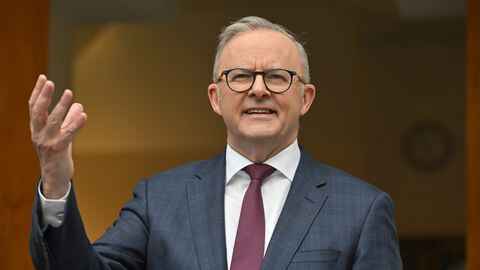Australia intends to enact historic legislation to establish a minimum age for using social media, with implementation starting a year after the law is passed.
On Thursday, the Australian government unveiled what it called world-first legislation that would impose a 16-year-old age limit on children’s social media use and hold platforms accountable for ensuring adherence.
Prime Minister Anthony Albanese declared, “I’m calling time on social media because it’s harming our children.”
The final two weeks of Parliament’s session this year, starting on November 18, will see the introduction of the legislation. Albanese informed reporters that the age restriction will go into effect a year after the law was ratified.
Facebook, Instagram, TikTok, and X would have to use that year to figure out how to keep Australian kids under 16 off their networks.
Thousands of parents, grandparents, aunts, and uncles have been the subjects of my conversations. Like me, they are really concerned about our children’s internet safety,” Albanese stated.
The recommendation is made at a time when governments everywhere are struggling with how to monitor how young people use social media and smartphones.
Underage children and their parents would not face penalties, but social media companies would if they violated the age restriction.
“Social media companies will have to show that they are taking appropriate measures to block access. Parents and young people won’t bear the burden,” Albanese stated.
The firm would obey any age restrictions the government wishes to impose, according to Antigone Davis, chief of safety at Meta, the corporation that owns Facebook and Instagram.
Davis said in a statement, “But what’s lacking is a deeper conversation on how we implement protections, otherwise we risk feeling better, like we have taken action, but teens and parents will not find themselves in a better place.”
She went on to say that a “simple and effective solution” would be to give parents more control over the apps their kids can use through operating systems and app stores.
A request for comment on Thursday was not immediately answered by X. TikTok chose not to respond.
A challenge for the twenty-first century
The age restriction was characterized as a “20th century response to 21st century challenges” by the Digital Industry Group Inc., an Australian advocacy group for the digital sector.
“We need to take a balanced approach to create age-appropriate spaces, build digital literacy, and protect young people from online harm instead of blocking access through bans,” said Sunita Bose, managing director of DIGI, in a statement.
According to Albanese, there will be exclusions and exemptions in some situations, such as when access to educational services must be maintained.
However, a youngster under the age of sixteen would not be entitled to access social media with parental approval.
The main opposition party has supported a 16-year-old age limit in principle.
The platforms already had the technology to impose such an age restriction, according to opposition legislator Paul Fletcher.
Fletcher told Australian Broadcasting Corp., “It’s not really a technical viability question, it’s a question of their readiness to do it and will they incur the cost to do it.”
“‘It’s all too hard, we can’t do it, Australia will become a backwater, it won’t possibly work,'” the platforms say. However, you can achieve the results if you have well-written laws and you don’t back down,” Fletcher continued.






